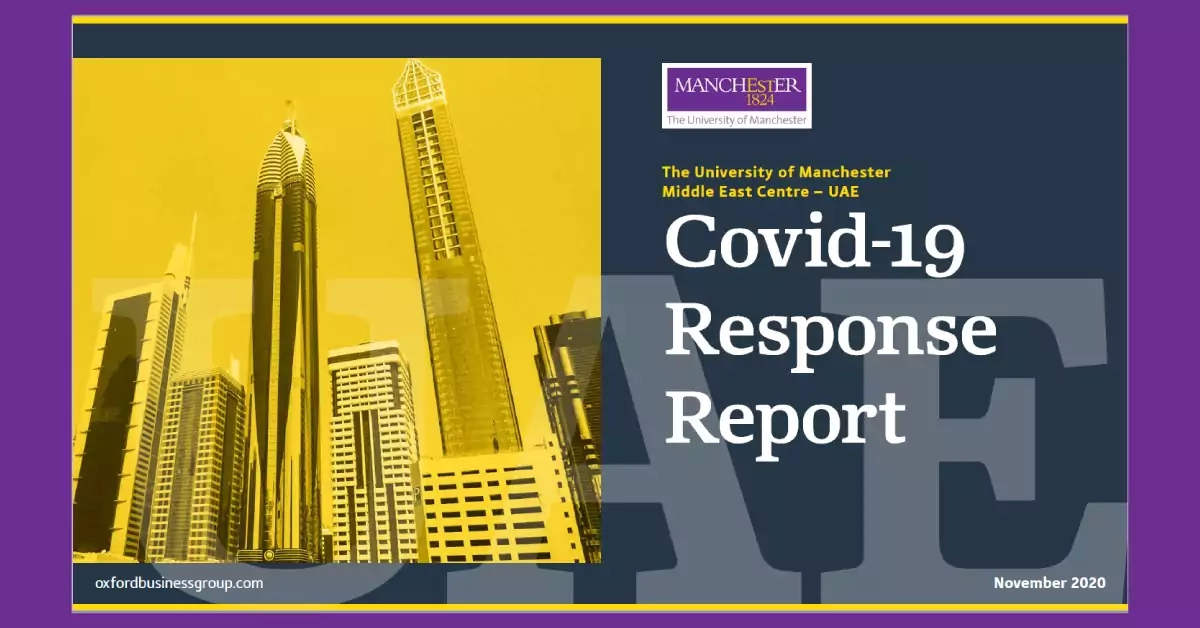
UAE, November 2020: The positive impact that sustained investment in health, technology and education has had on the UAE’s efforts to reduce the impact of the coronavirus and move towards recovery are mapped out in a new Covid-19 Response Report (CRR) by Oxford Business Group (OBG), produced in partnership with The University of Manchester (UoM) Middle East Centre in Dubai.
The CRR provides in-depth analysis of the UAE’s response to the pandemic in an easy-to-navigate and accessible format, focusing on key data and infographics relating to the country’s socio-economic landscape.
In its report, OBG considers the part that the UAE’s focus on healthcare spending played in providing the country with medical resilience when the coronavirus arrived, helping the country to achieve both the highest number of tests per confirmed cases in the world and one of the lowest case fatality rates.
It also gives details of the measures introduced by the authorities to support local businesses, which ranged from postponing interest payments to introducing stimulus packages for local banks in a bid to boost liquidity and lending.
OBG’s report looks at how the UAE’s education sector adapted to new ways of operating during lockdown. It analyses, in particular, the part that technology played in helping to ease the transition to remote learning at the height of the pandemic, facilitated by the country’s robust digital infrastructure and strong ICT adoption rating.
In addition, licence-holders will find coverage of the steps that the University’s Middle East Centre took to increase digital engagement for its large regional community of part-time MBA students when the pandemic arrived - a move it was able to make quickly, due to an already strong blended learning platform, combining online study and face to face workshops. This swift shift in operations enabled the centre to deliver 654 MBA workshop virtual sessions in July, up from 534 in January, while also rolling out a series of publicly accessible online webinars.
Randa Bessiso, Middle East Director at The University of Manchester, stated that alongside the digital experience, there is a clear need to ensure we maintain human connections. Soft skills such as leadership, creativity and innovation, and adaptability will remain essential elements of existing programmes and new ones.
“The emergence of educational technology (EduTech) will help create access to lifelong learning opportunities in response to the rapid obsolescence of existing skills, while flexible part-time blended learning opportunities will help sustain employability,” Bessiso told OBG.
“I believe we will see a surge in creative partnerships between educational institutions, as organisations try to build on our new collective experience and quickly add capabilities, resources and reach.”
Andrew Jeffreys, OBG’s CEO, said that while the UAE has had to wrestle with the challenges produced by both Covid-19 and lower oil prices, successful efforts to put strong, broader economic foundations in place before the pandemic arrived bode well for recovery.
“Businesses inevitably remain concerned about the impact of Covid-19 and consumer sentiment will have a key part to play in driving recovery, both in the emirates and beyond,” he said. “However, our research shows that the UAE’s private sector is adapting to the new normal, having benefited from decisive, supportive action in the early stages of the outbreak and the country’s focus on achieving the goals laid out in its National Vision 2021 roadmap.”
The CRR forms part of a series of tailored reports which OBG is currently producing with its partners, alongside other highly relevant, go-to research tools, including a range of country-specific Covid-19 Economic Impact Assessment articles and interviews.
Consult the CRR report here.
